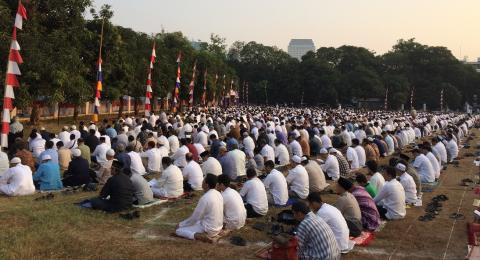Obey Health Protocol during Eid al-Adha
By: Hananta) *
Eid al-Adha is a holiday where many people sacrifice a cow or a goat. During the Covid-19 pandemic, naturally the procedure for slaughtering sacrificial animals was changed. Must comply with health protocols, so as not to cause new clusters. The mosque committee is also required to socialize it to the slaughterers and recipients of qurban meat.
Soon we will celebrate Eid al-Adha. In this happy moment, there is something special, qurban, cow, goat, or sheep. In the past, animal slaughtering could be done in the field or mosque yard, and between the slaughterers were in a fairly close position. But now it has changed, because qurban must comply with health protocols.
The Minister of Religion, Fachrul Razi, appealed to the public to be orderly in complying with health protocols, both during Eid prayer and when slaughtering sacrificial animals. All adapted to the new normal life order. The Ministry of Religion has issued circular number 21 of 2020 concerning slaughtering animals and halal qurban meat.
Sacrificial slaughter animals in accordance with health protocols are regulated as follows. First, all slaughterers must wear masks and gloves, and wear long sleeves. Gloves can also only be used once and may not be lent to each other. There is a separation between the slaughterers so keep the distance keeping rules.
A machete and knife made for slaughter must also be sharpened so that the sacrificial animal dies quickly. Before it is made to cut cattle and goats, the machete should be soaked in hot water to make it more hygienic. Similarly, after slaughter is used, must be quickly cleaned. So that everything is hygienic and there is no gap to transmit the Covid-19 virus.
The problem of environmental cleanliness is also highlighted. The committee immediately sprayed and cleaned the road that was passed by sacrificial animals and the yard of the mosque or field, which became a place for slaughtering cattle and goats. So, at night, all are free from dirt and blood from the slaughter. Because hygiene is a condition if you want to be free Corona.
In addition, when distributing qurban animals there should not be queues as usual, because it violates the rules of keeping distance. The committee immediately distributed it to residents who were entitled to receive meat, and were required to wear masks. Also obliged to reduce physical contact with the recipient. So, just put the plastic meat in front of the recipient’s house, then he took it himself.
Satriyo Krido Wahono, Head of the LIPI Natural Materials Technology Research Center explained that this health protocol was not only carried out during the sacrifice of sacrificial animals. But it also starts from the period of maintenance, purchase, shipment of animals, and distribution of qurban meat. Also guided by aspects ASUH (safe, healthy, whole, and lawful).
The new method of slaughtering sacrificial animals during the Corona pandemic is very good because it is able to minimize the transmission of the Covid-19 virus. The slaughterer is equipped with protection while on duty, even though he doesn’t use PPE. But it is sufficient to protect themselves from Corona attacks. Provided that after returning from work, he immediately showered, washed, and changed clothes.
At the time of distribution of qurban meat, it should be given directly to the recipient, namely the poor who have the right. Very sorry if they are tired of queuing, and if there are hordes of people instead of being worried instead of making a new Corona cluster. The cleaned meat is put into 2 layers of plastic, so it is clean and does not leak easily.
The slaughter of sacrificial animals during Eid al-Adha during the Covid-19 pandemic must comply with health protocols. Officers must wear masks and gloves, and wear long-sleeved clothes. When meat is distributed, there should be no direct contact with residents who receive it. All this is done to keep it safe and we can be free from Corona.
) * The author is a citizen, active as a caretaker in the mosque in Jakarta
